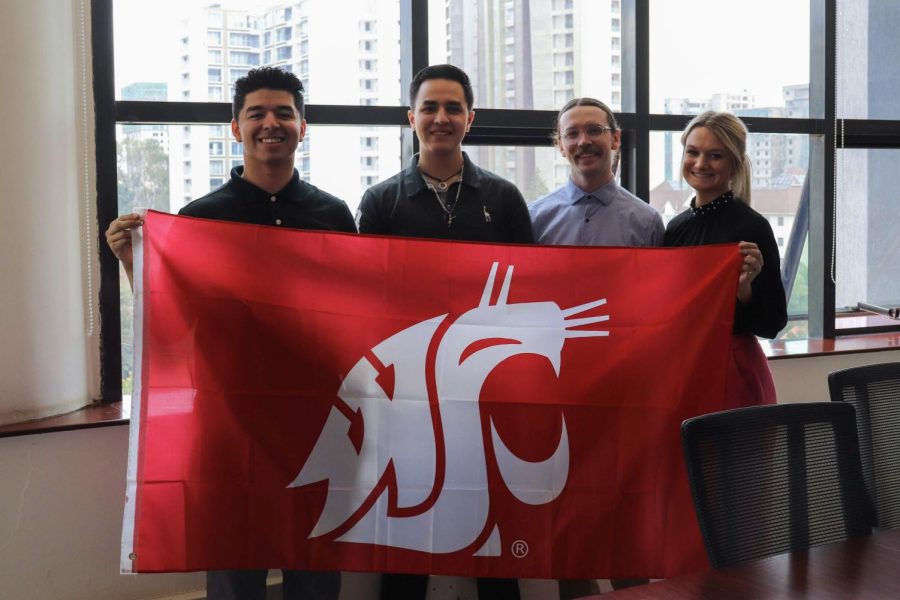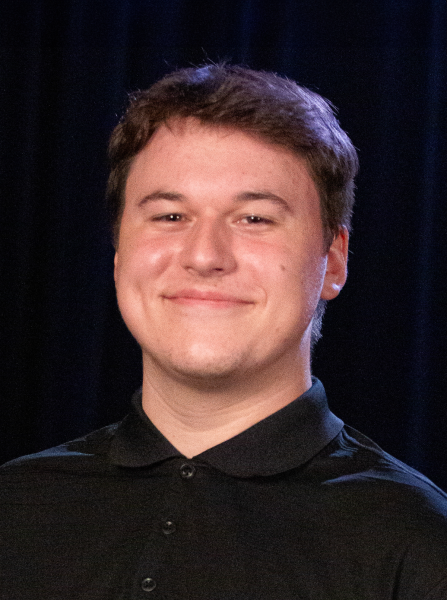Murrow students reflect on a successful trip to Kenya
Four students came back from the trip with newfound skills and appreciation for other cultures
Alvarado and three other WSU Murrow students embarked on a week-long trip over spring break to Kenya.
March 27, 2023
A trip to Kenya was something Damien Alvarado did not expect, and yet it had a profound impact on his worldview and skills as a journalist.
Alvarado, senior broadcast news major, and three other WSU Murrow students embarked on a week-long trip over spring break to Kenya. Their mission was to investigate and cover issues related to emerging infectious diseases, the progress made on the understanding of them, and research and global health initiatives in the region.
The three other students attending the trip were senior multimedia journalism major Nick Gibson, senior broadcast news major Alfonso Valdivia and Josie Goodrich, junior multimedia journalism and criminal justice double-major and current Evergreen copy editor.
On the trip, the students visited researchers around Nairobi and surrounding areas to learn about zoonotic diseases, diseases transferred from animals to humans, specifically diseases transmitted from Camels.
The primary disease focused on was MERS-Cov and how Kenyan researchers are trying to understand better why it is affecting the Middle East much more than Kenyans. The students got to see the research first-hand and how they tested workers before and after their shifts working with the camels, Gibson said.
“Up in the Middle East, MERS-Cov will have a 40% mortality rate, but in Kenya they have found three cases and they have all been asymptomatic. So they’re doing their research to find out what is going on there,” Gibson said.
During their time in Kenya, they worked first-hand with Andrew Karani, a MERS-Cov Camel Research Project lead researcher, who Gibson said was very helpful and eager to share their research.
This research is so important in Kenya is because they “fear death.” With that fear of death, Alvarado said they work tirelessly to find ways to prevent it or slow it down.
Outside of seeing the camels, the students saw a converged newsroom, went on two game rides, visited local shops and spent time in the community, Alvarado said.
However, visiting Laisamis Catholic Hospital and seeing all their great work will be the most enriching moment from the trip for Gibson and is something that he said will always stay with him.
“It was just really rewarding, I think to see that hospital [Laisamis Catholic Hospital]. My mom has worked in healthcare her whole life. It is just kind of the main source of healthcare for a severely underserved community with the county government not providing much support,” he said.
Being in another country and pursuing stories that are separate from what they see in Pullman, the four students were pushed out of their comfort zone, but that is something that helped them grow a lot as reporters while they were over there, Gibson said.
Despite initially being intimidated by the idea of covering healthcare and research, Gibson said he is glad to have been allowed to cover it.
“To be able to see it like in the field, first-hand, I think, flipped my perspective on it,” he said.
Alvarado said he was out of his comfort zone as well but did not feel as if he was completely out of his element in the other country.
“Being able to experience someone else’s culture and not feeling like I was intruding was the biggest takeaway. I think they were very welcoming in allowing us to understand their backgrounds, their culture and teaching us new things,” he said.
Two reasons why he said he felt as if he did not intrude were the hospitality in Kenya as well as the appreciation of the media that researchers and Kenyans in general have.
“Hospitality is amazing there. Everyone is willing to talk to you and is so nice. We had our waiter even join us for dinner at one point. Culturally, them accepting and bringing us into their home, it felt really good,” Alvarado said.
Despite being there for a week, both Alvarado and Gibson wish they had more time to work on their stories and pursue stories outside of the scope of the trip.
“When we left, I was like, ‘I want to live here.’ I would want to live and work there. I would love to do more political work there and maybe do international coverage, Gibson said.
Other than the actual research and stories, the group went to a restaurant to debrief every night, something Gibson said will turn into a lasting memory.
“There was this restaurant around the corner from our hotel that we always went to. I will always remember hanging out on that patio and having a beer with Damian, Poncho [Alfonso], Josie and Laura,” Gibson said.
As the students finish their work, they will propose it to local publications to get it published. To read more, Goodrich posted her account of the trip in her latest Cougar Cowgirl column for the Evergreen.
















